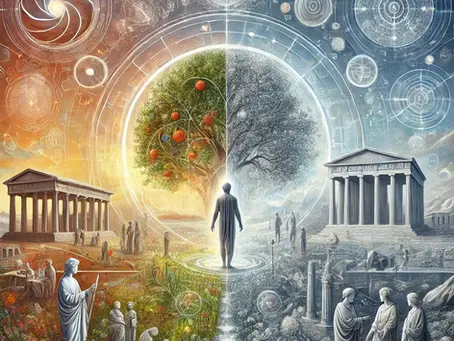top of page
All Posts


Planned Obsolescence of Emotions in Contemporary Society
This essay transposes the concept of planned obsolescence from industrial production to the realm of human emotions, arguing that in a society of hyperconnectivity and surveillance capitalism, affects come to be structured as ephemeral, disposable, and replaceable.
Jan 1168 min read


Between the Cave and the Tao: Contemplation and Action in Western and Eastern Philosophy — A Comparative Analysis of Plato, Hannah Arendt, and Asian Traditions
This essay undertakes a comparative and critical analysis of two foundational paradigms of Western philosophy — the vita contemplativa (bios theoretikos), as established by Plato, and the vita activa, as phenomenologically rehabilitated by Hannah Arendt — investigating how these traditions structure the relationship between thought and action. The study examines the ontological hierarchy that has traditionally subordinated political action to the contemplation of eternal trut
Dec 7, 202535 min read


Conceptual Dictionary of the Anthropocene: Vocabulary for Enhanced Contemporary Environmental Experience (Final Part)
We inhabit the Anthropocene: cascading climate crises, biodiversity collapse, and socio-environmental inequalities demand fundamentally new approaches. This dictionary provides a robust, interdisciplinary conceptual framework for navigating these complex entanglements. Our aim is to offer comprehensive, rigorously grounded responses informed by multidisciplinary analyses, seeking a holistic and critical understanding of the contemporary world.
Nov 23, 20259 min read


Conceptual Dictionary of the Anthropocene: Vocabulary for Enhanced Contemporary Environmental Experience (Penultimate Part)
We live in the Anthropocene: climate crises, biodiversity loss, and socio-environmental inequalities demand new approaches. This dictionary offers a robust and interdisciplinary conceptual framework for navigating these complex relationships. Our objective is to provide comprehensive, well-founded answers with multidisciplinary analyses, aiming at a holistic and critical understanding of the contemporary world.
Nov 8, 20257 min read


Conceptual Dictionary of the Anthropocene: Enhanced Vocabulary for the Contemporary Environmental Experience (Part 3)
We live in the Anthropocene: climate crises, biodiversity loss, and socio-environmental inequalities demand new approaches. This dictionary offers a robust and interdisciplinary conceptual framework for navigating these complex relationships. Our goal is to provide comprehensive, well-founded answers with multidisciplinary analyses, aiming for a holistic and critical understanding of the contemporary world.
Oct 26, 20257 min read


The Cure Through the Ear: Beethoven Defying Science
Beethoven, in all his glory, would continue playing. But now, accompanied by the severe yet liberating scientific evidence. Art and science, finally finding a point of convergence in the complex journey of human existence, where the melody of life intertwined with the rigor of truth.
Oct 19, 20259 min read


Conceptual Dictionary of the Anthropocene: Vocabulary for the Enhanced Contemporary Environmental Experience (Part 2)
We live in the Anthropocene: climate crises, biodiversity loss, and socio-environmental inequalities demand new approaches. This dictionary offers a robust, interdisciplinary conceptual framework to navigate these complex relationships. Our goal is to provide comprehensive, well-founded responses, supported by multidisciplinary analyses, aiming for a holistic and critical understanding of the contemporary world.
Oct 12, 20257 min read


Sad Tropics: The Weight of Writing
His pen hovered over the blank paper, trembling slightly. The complex words, the brilliant concepts that would define his career and influence the discipline for decades, suddenly seemed empty as shells of dead insects. They were elegant traces, like Aritana's, trying to dominate a chaos that infinitely transcended them. The headdress under glass was a fossil, not of a culture, but of a fleeting moment of encounter that carried within itself the germ of destruction.
Oct 4, 202518 min read


Conceptual Dictionary of the Anthropocene: An Enhanced Vocabulary for the Contemporary Environmental Experience (Part 1)
We live in the Anthropocene: climate crises, biodiversity loss, and socio-environmental inequalities demand new approaches. This dictionary offers a robust and interdisciplinary conceptual framework to navigate these complex relationships. Our goal is to provide comprehensive, well-founded answers with multidisciplinary analyses, aiming for a holistic and critical understanding of the contemporary world.
Sep 27, 20259 min read


The Architect of Shadows: An Urban Phenomenology
It was the third week since he had abandoned the Contemporary Art Museum project after the meeting that would seal his professional fate. "Absence of contrasts," he murmured, compulsively leafing through the annotated margins of Being and Time that he devoured during his insomnia. Each page bore feverish scribbles in his own handwriting: "Modern technology reveals beings as available stock," "Being-in-the-world is not spatial, it is spatializing," "Anxiety unveils nothingness
Sep 20, 20257 min read


Post-Weberian Manifesto: Refounding the Ethics of Responsibility in the Digital Age – A Historical, Philosophical, and Multidisciplinary Analysis
This manifesto, by calling for a refounding of the ethics of responsibility, invites a multidisciplinary reflection that spans the sociology of technology, cultural critique, and existential philosophy—seeking to understand how technique has supplanted politics, and how calculation has anesthetized utopia.
Sep 13, 202517 min read


The Palace of Broken Mirrors: Sergei Through Four Lenses and Two Plateaus
In 1926, the gray snow of Vienna clung to the boots of Sergei Pankejeff, now a middle-aged man marked by melancholy. He was no longer the young Russian aristocrat who had arrived at Berggasse 19, consumed by phobias and the specter of white wolves. Now, he carried the burden of being the Wolf Man, an enigma in psychoanalysis, whose analytical journey would lead him into a labyrinth of interpretations made by brilliant and distinct minds.
Sep 6, 202513 min read


Essay - For an Autonomous Poetic Vocabulary: Interdisciplinary Perspectives on the Construction of Ideal Objects for Poetic Needs
This essay examines a radical perspective: the construction of a truly autonomous poetic vocabulary, composed of "ideal objects created by convention and intended for poetic needs." Such a vocabulary would not be parasitic on common language, but rather an independent semiotic system with its own rules and aesthetic purposes. The originality lies in the postulation of signs that do not aim to represent the world, but to constitute it in the poetic act.
Aug 30, 202529 min read


The Binder of Silences
In the bay where time dissolved into salt and melancholy, Isadora lived in a house that defied the laws of physics and reason. Built upon the wreckage of sunken ships and anchored by chains of black iron, the floating structure swayed with the tides of memory. Its walls were a living library: pages from 1847 Webster's dictionaries, Larousse volumes worn by humidity, and Aurélio with definitions that changed according to the wind's mood.
Aug 22, 202516 min read


Essay - Revisiting Nicomachean Ethics and the Concept of Justice in Aristotle
This essay proposes a tension-filled reading of Aristotelian justice, highlighting not only its theoretical merits but also the internal contradictions that arise when confronting principles with applications. It is argued that such contradictions, far from invalidating it, form a conceptual laboratory. It sheds light on perennial issues: the relational nature of justice, the limits of practical rationality, and the dangers of the naturalization of hierarchies.
Aug 15, 202524 min read


SK 1
Leo’s apartment smelled like an early hangover: spilled alcohol, sweat of anxiety disguised as fun, and the sweet vapor of dying Juuls. It was the scent of an end—of a night, of a love, of an illusion that refused to die. He leaned against the doorframe of the kitchen, the dead Juul weighing in his pocket like a revolver without bullets. He needed to leave. The party was a corpse still writhing to the sound of a random playlist.
Aug 8, 202510 min read


Essay - Lending Aura and "Terroir" to Artistic Production: Strategies to Recover Authenticity in the Digital Age
This article proposes practical strategies for artists to recreate aura and terroir in their productions, resisting the standardization imposed by the cultural industry and digital dematerialization.
Aug 1, 20258 min read


Essay - Artificial Intelligence and the Future of Artistic Connection: When Machines Challenge Human Authorship
This essay explores how dematerialized authorship challenges our deepest notions of art and examines whether the absence of the human element will radically reshape our relationship with the artistic phenomenon.
Jul 26, 202514 min read


Tale: Garden of Words
The tale is thus a speculative philosophical journey, born from the collision between Talleyrand's practical maxim and radically different visions on the purpose and power of language. It is an impossible meeting in a timeless space (the "Garden of Words"), where four masters of language (or its disdain) debate its essence, revealing, through their contradictions and complementarities, the many faces—and dangers—of this unique human gift Talleyrand mastered and mistrusted so
Jul 20, 20257 min read


Essay - The Preference for the Persona: Why We Admire Artists More Than Their Works?
This essay briefly explores the theoretical foundations of this dynamic, correlating psychological, sociological, and marketing concepts with empirical data to understand how the artist's persona becomes a more relevant object of admiration than their works.
Jul 19, 202510 min read
bottom of page